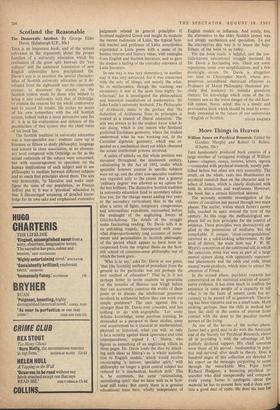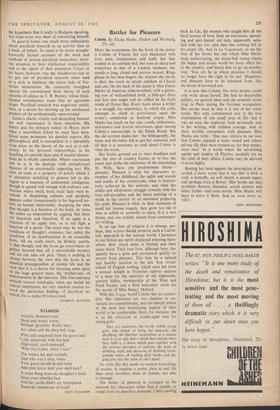More Things in Heaven
William James on Psychical Research. Edited by Gardner Murphy and Robert 0. Ballou. (Chatto, 30s.)
THIS handsomely produced book consists of a large number of variegated writings of William James—chapters, essays, reviews, letters, reports —connected with psychical research, mostly pub- lished before but often not very accessibly. The result, on the whole, casts less illumination on psychical research than on the character and in- tellect of James, which is clearly displayed with both its attractions and weaknesses. However, the book has a certain historical interest.
The seriously scientific investigation of the claims of occultism has passed through two main phases. The earlier, within which James's career falls, reached its apex around the turn of the century. At this stage the methodological em- phasis fell on firm principles for the control of evidence. These principles were destructively ap- plied to the pretensions of mediums but the remarkable, if unique, 'cross-correspondences' survived as a solid-looking'achievement. At the level of theory, the main item was F. W. H. Myers's conception of the subliminal self, in which the conscious mind was seen as part of a large mental system along with apparently supernor- mal phenomena and the odds and ends, those mental waste-products, which were to attract the attention of Freud.
In the second phase, psychical research has concentrated on the statistical analysis of quanti- tative evidence. It has done much to confirm the existence in some people of a capacity to tell what is on the faces of unseen cards too ac- curately to be passed off as guesswork. Theoris- ing has been tentative and on a small scale. More striking, perhaps, than the shift in method has been the shift in the centre of interest from contact with the dead to the peculiar mental powers of the living.
As one of the heroes of the earlier phase, James had a good deal to do with the American end of the Society for Psychical Research, above all in providing it with the advantage of his publicly declared support. His chief concerns were those of his period : mediumship in prac- tice and survival after death in theory. Over a hundred pages of this collection are devoted to his report on the messages purporting to come through the remarkable Mrs. Piper from Richard Hodgson, a bouncing psychical re- searcher who died unexpectedly and compara- tively young. James is apologetic about the material he has to present here and it does con- tain a good deal of static. He does his best for
the hypothesis that it really is Hodgson speaking, but stops some way short of committing himself.
In general James was much more enthusiastic about psychical research as an activity than as a body of beliefs. To assist it he wrote straight- forwardly factual accounts of the work and methods of serious psychical researchers, draw- ing attention to their intellectual respectability and to the rigour of their procedure. Closer to his heart, however, was the mischievous fun to be got out of psychical research when used as a stick to belabour the coarse hide of Vic- torian materialism. He constantly inveighed against the conventional Bosh theory of such apostles of science as T. H. Huxley, whose thick- headed complacency made him an agreeable target. Psychical research was negatively useful, then, as a device for showing up the intellectual prudery of the professionally open-minded.
James's charm, vitality and abounding humour are well represented in these selections. His letters and his obituary, notice of Myers show What a marvellous friend he must have been. Good sense permeates his detailed reports. His philosophical skill is exemplified in a splendidly crisp piece on the theory of the soul as a sub- stance. In his personal relationships, in his handling of concrete facts and of neutral abstrac- tions he is wholly admirable. Where reservation sets in is in his dealings with metaphysical theories of an emotionally appealing sort. His view of truth as a property of beliefs which it is ultimately satisfying to possess led' in this region to a measure of sentimental indulgence, though it agreed well enough with ordinary con- victions where small, hard, local facts were in- volved. A disquieting softness and plasticity appears rather conspicuously in his Ingersoll lec- ture on human immortality. Accepting the view that thought is a function of the brain, he turns the tables on materialism by arguing that there are functions and functions. If an apple is a function of an apple tree, so is red light a function of a prism. The brain may be, not the condition of thought's existence, but rather the condition of its manifestation in an accessible form. All we really know, he blithely asserts, is that thought and the brain go everywhere to- gether; beyond that, all is unverifiable mystery and we can take our pick. There is nothing to Choose between, the view that the brain is an essential presupposition of mental life and the view that it is a device for focusing some parts of the huge general mass, the `mother-sea,' of consciousness in the universe. This free-and-easy attitude toward ontologies, when put beside his radical empiricism, his very marked caution to- ward the particular findings of psychical re- search, has a rather frivolous look.
ANTHONY QUINTON































 Previous page
Previous page